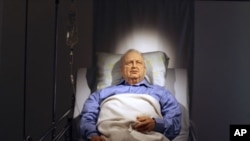A protein which occurs naturally in the body reduces brain lesions caused by a stroke, according to a new study.
The protein is called alpha-B-crystallin and, in mice, appears to be effective up to 12 hours after a stroke occurs.
Stroke is one of the world's top killers, and a leading cause of disability. According to the World Health Organization, 15 million people suffer a stroke each year. One-third of them die, and another third are permanently disabled. Treatment options have been limited.
In most cases of stroke, a blood vessel in the brain becomes clogged, cutting off the supply of oxygen and nutrients to brain tissue. Within a short time, brain tissue begins to die.
The only treatment is a clot-buster called tissue plasminogen activator, or tPA. But it is only useful when given in the first hours after a stroke. Also, tPA doesn't work against the next part of a stroke event, when immune system cells rush in to protect the brain but actually promote dangerous inflammation.
"In any individual person, the inflammatory component may make up as much as twice the degree of injury as the initial damage," says Dr. Gary Steinberg of Stanford University's medical school and co-senior author of the study.
A few years ago, Steinberg and his colleagues found that a naturally-occurring protein called alpha-beta-crystallin could reduce brain damage in multiple sclerosis patients. They thought it might also prevent brain damage in stroke victims.
To find out, they first used two groups of laboratory mice - normal mice whose bodies make the protein, and a special variety that does not produce the protein. They induced strokes in both groups of mice, but the strokes were much worse in the mice bred not to produce the alpha-beta-crystallin.
"We then delivered the same protein or molecule, a-beta-crystallin, into the mice through an injection and found that we could protect the brains of the mice further by giving additional a-beta-crystallin," Steinberg said.
That suggests that the protein might be used to limit the damage in human stroke patients, too.
Steinberg says using alpha-beta-crystallin could represent a unique approach to stroke treatment.
"I think that's what's exciting about it. It's basically utilizing an endogenous or native mechanism that we think is present in stroke victims already, but it's not robust enough, and we are augmenting it, and it attacks the inflammatory component, which is unique."
Steinberg says more animal tests are needed before they can move on to human trials.
Study: Natural Protein Reduces Brain Damage Caused by Stroke
- By Art Chimes

Appears to be effective up to 12 hours after a stroke occurs



